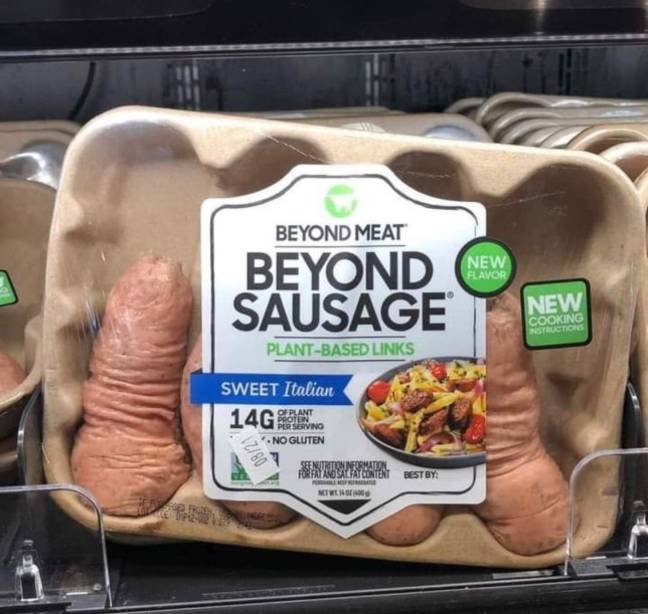Whatever the label may say about the macronutrient content of plant-based ‘meats’, the devil is in the details. Plant-based ‘meats’ are deficient in a wide-variety of essential metabolites, as a new study from Duke University shows.
Plant Based Meat Study
Despite claims by manufacturers and advocates that plant meat substitutes are just as good as, or even better than, the real thing, a new study out of Duke University has confirmed that this just isn’t the case.
Meat-substitute manufacturers have bent over backwards to try to make their substitutes look , feel, taste and smell like meat as much as possible. One of the most well-known examples is their attempt to make the meat ‘bleed’ through the use of leghemoglobin, an iron-carrying molecule from soy, and red beet, berry and carrot extracts.
Manufacturers thicken the texture of plant meat by adding indigestible fibers like methyl cellulose, and, to increase the protein content, use isolated plant proteins from soy, peas, and other plant sources. Some meat-substitutes also add vitamin B12 and zinc to further replicate meat’s nutrition.
But nutrition isn’t about much more than the macronutrients and select micronutrients that go on the product’s label, and this is where the latest study, published in Scientific Reports, comes in.
We like this picture. It says so much.
However, many other components of nutrition do not appear on the labels, and that’s where the products differ widely from meat, according to the study, which appears this week in Scientific Reports.
“To consumers reading nutritional labels, they may appear nutritionally interchangeable,” said Stephan van Vliet, a postdoctoral researcher at the Duke institute which led the research. “But if you peek behind the curtain using metabolomics and look at expanded nutritional profiles, we found that there are large differences between meat and a plant-based meat alternative.”
The Duke Molecular Physiology Institute’s metabolomics lab compared 18 samples of a popular plant-based meat alternative to 18 grass-fed ground beef samples taken from an Idaho. The samples were made into patties, cooked and then analysed. The researchers found that 171 out of the 190 metabolites they measured varied between the beef and the plant-based meat substitute.
The beef contained 22 metabolites that the plant substitute did not. The plant-based substitute contained 31 metabolites that meat did not. The greatest distinctions occurred in amino acids, dipeptides, vitamins, phenols, and types of saturated and unsaturated fatty acids found in these products.
Several metabolites known to be important to human health were found either exclusively or in greater quantities in beef. These include creatine, spermine (involved in metabolism), anserine (has neuroprotective effects), cysteamine (a precursor to the neurotransmitter hypotaurine), glucosamine (important for cartilage and joint health), squalene (involved in skin lubrication and protection), and the omega-3 fatty acid DHA.
“These nutrients have potentially important physiological, anti-inflammatory, and or immunomodulatory roles,” the authors said in the paper.
Click here to read about the important role testosterone has to play in modulating immune response.
“These nutrients are important for our brain and other organs including our muscles” van Vliet said.
The authors were quick to add that vegan diets can be healthy. “But some people on vegan diets (no animal products), can live healthy lives — that’s very clear.” They also pointed to the metabolites that weren’t found in beef but were found the plant ‘meats’, such as phytosterols and phenols.
How a ‘healthy’ plant milk is made
“It is important for consumers to understand that these products should not be viewed as nutritionally interchangeable, but that’s not to say that one is better than the other,” said van Vliet, a self-described omnivore who enjoys a plant-heavy diet but also eats meat. “Plant and animal foods can be complementary, because they provide different nutrients.”
Recent pronouncements on the state of plant-based meat alternatives have been rather less sanguine. We reported on a press release that admitted that plant-based meat alternatives qualify at present as just another unhealthy form of processed food.
Scientists have also warned that children who are fed vegan diets by their right-on parents are at serious risk of malnutrition and must be put on long-term supplementation to ensure their dietary needs are met.
With so much money to be made from these new ersatz foods, such admissions about their quality are unlikely to prove fatal to the enterprise to replace real meat with ultra-processed plant alternatives.
A noticeable change, however, can be seen in the way that these products are being marketed to the public. Social pressure is now becoming an essential part of the marketing campaigns used by plant-based food manufacturers, as they realise that any taste or health claims they make are likely to fall flat.
Oatly’s ‘Help Dad’ campaign is a particularly striking example of a new kind of shame-based advertising, with hopeless ‘unwoke’ dads being shamed by their ‘enlightened’ children for drinking cow’s milk.

Don’t hesitate to email us at [email protected] for personalized coaching and a client questionnaire if you’d like DEDICATED tailor-made personal training on strength training, building muscle, losing fat, developing athleticism, and more — all to your liking, lifestyle, habits, and taste!
Otherwise, don’t forget to claim your FREE eBook detailing how to lose 20lb of fat while building muscle in 12 weeks! You can claim it here.
Alternatively, you can pick up a FREE eBook on fundamental strength principles offering an introductory workout program.













